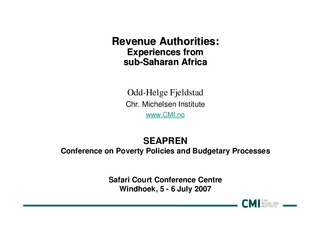Revenue authorities: Experiences from sub-Saharan Africa
Original version
Presented at: SEAPREN Conference on Poverty Policies and Budgetary Processes. Safari Court Conference Centre. Windhoek, 5 - 6 July 2007.Abstract
In most developing countries national tax collection is carried out by line departments within the Ministry of Finance. However, over the past two decades more than 30 developing countries, especially in Latin America and Africa, have created revenue authorities whereby the tax administration function has devolved from the Ministry of Finance to a semiautonomous entity. In Africa alone there are now more than 15 revenue authorities. The purpose of this paper is to compare the experiences with the revenue authority model in selected African countries. The paper analyses features of the model, examines reasons why revenue authorities were established, and discusses successes and failures. It also assesses whether and how the revenue authorities may have contributed to improved performance and compliance with the tax law. The paper concludes that the establishment of a semi-autonomous revenue authority offers no ‘quick-fix' to a country's revenue and tax administration quandaries. Creating a RA is expensive, may take a long time and require significant effort. Moreover, evidence is inconclusive whether the establishment of a revenue authority has led to better revenue administration performance compared to what would have been the case had the tax administration remained a department of government. However, a revenue authority can establish a platform from which change can be facilitated, but its initial impact and longer-term successful performance, depend on the strength and quality of the management of the revenue authority; political commitment; and sustained public and private sector support.
